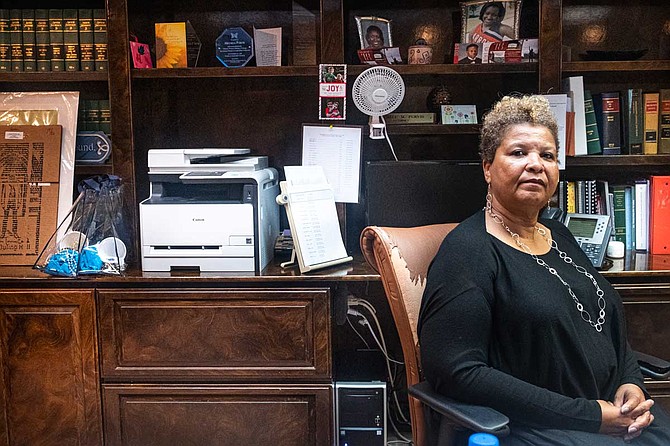Michele Purvis Harris has advocated for pay equality with the DA’s office throughout her tenure as Hinds County public defender. She retires Dec. 31. Photo by Seyma Bayram
When Michele Purvis Harris was city attorney of Jackson, she heard troubling remarks from the people her office was supposed to prosecute.
"I don't want the public defender, I want a real attorney," poor defendants would say to the judge. For Harris, who will retire from her role as Hinds County public defender on Dec. 31, changing the public's perception of indigent defense was paramount to restoring trust in her office when she first assumed it in 2012.
"I wanted people to know that we were going to work hard for them," Harris said in her office in downtown Jackson.
Seven years later, Harris believes her team of 12 defense lawyers and two investigators have regained the community's trust. But she admits the difficulties of serving in Mississippi, where individuals are caught between a sorely underfunded public-defender system, on the one hand, and a lack of statewide guarantees of effective counsel and a speedy trial on the other.
Harris compared the criminal-justice system to a three-legged stool consisting of law enforcement, the prosecutor and defense. In order for the system to work fairly, all three legs must be balanced. But too often, whether due to pressure from voters or concerns about what the public might think, lawmakers prioritize spending on law enforcement and prosecution.
"We're left behind," Harris said of the resulting funding discrepancies.
"We are always behind."
'A Black Hole'
Octavious Burks and Joshua Bassett filed a class-action lawsuit in 2014 after Scott County jailed them without indictments, without representation and on unaffordable bail for multiple charges, ranging from attempted armed robbery and disorderly conduct to possession of methamphetamines, between 2009 and 2014.
"All told, Mr. Burks has spent over three years in the Scott County jail since Aug. 30, 2009, on three separate charges. ... He has only been indicted once, he has never been to trial, and he has never been convicted," court documents later revealed.
Now-deceased Circuit Judge Marcus Gordon refused to assign public defenders to either man until after indictment—a grand jury's formal charge—which is contrary to state law.
Public defenders are court-appointed, government-funded lawyers for people who are accused of crimes but cannot afford representation. The U.S. Supreme Court's 1963 ruling in Gideon v. Wainwright required all states to provide free lawyers for poor defendants in criminal cases.
In Mississippi, people who face jail time can sign an affidavit of indigency—a written statement, signed under oath, which declares their inability to pay for an attorney. The affidavit guarantees them immediate access to a court-appointed lawyer. Miss. Code Ann. § 25-32-9 states that those in need must have "representation available at every critical stage of the proceedings against him where a substantial right may be affected" and, furthermore, that "(n)o person determined to be an indigent . . . shall be imprisoned as a result of a misdemeanor conviction unless he was represented by the public defender or waived the right to counsel."
Despite proof of indigency, in some Mississippi counties, people like Burks and Bassett are not appointed lawyers until after indictment.
In 2018, the Sixth Amendment Center published a report on indigent defense services in Mississippi, at the request of the Mississippi Public Defender Task Force. The report, which focused on trial-level felony cases, found that the State of Mississippi does not provide indigent defense funding except in death-penalty cases. Instead, cities and counties must fund and provide those services themselves.
Only eight of Mississippi's 82 counties currently have public-defender offices: Hinds, Jackson, Harrison, Forrest, Pearl River, Lamar, Lauderdale and Washington. Both the Lamar and Lauderdale offices have one full-time practicing lawyer.
Private attorneys represent clients in counties with no public-defender offices or when public defenders face conflicts of interest, such as in cases involving co-defendants. The county pays that private attorney either hourly or at a fixed rate through its general fund, but payment is capped at $1,000 per case, the report points out, regardless of the time required to defend the case.
This can incentivize lawyers to dispose of cases quickly. Excessive caseloads and insufficient time for defendants to consult with attorneys constitute additional "marker(s) of constructive denial of counsel," the report warned.
The center also found a serious lack of state oversight to ensure independence "from undue judicial interference" in how attorneys are chosen and compensated. When judges pick the attorneys to represent indigent clients, this "(renders) the defense attorneys beholden to the judge for their livelihood," the Sixth Amendment Center stated.
That can lead to a courtroom culture where lawyers might censor their arguments for fear of upsetting judges.
Indigent pre-trial defendants suffer the most under the current system. "Throughout the state of Mississippi, indigent defendants charged with felony offenses are denied the right to counsel at the critical pretrial stage between arrest and arraignment following indictment, a period that is commonly at least a few months and occasionally as long as a year or more," the report stated.
What has resulted is a system in which people awaiting trial end up falling into a "black hole," to borrow a phrase some Mississippians used in the Sixth Amendment Center study.
Pay Parity Problems
"Every day I'm getting inmates writing me," Hinds County Senior Circuit Judge Tomie Green said, raising her hand to mimic a tall stack of papers. She pointed to a freshly opened letter on her desk in her chambers. A man in the Hinds County Detention Center had written to Green to complain about his prolonged pretrial incarceration. He had not yet seen a lawyer after three months in jail.
This scenario is at odds with a 2017 Mississippi Supreme Court ruling and now-revised Mississippi Rules for Criminal Procedure. Before the start of each circuit-court term, senior circuit judges must assess the conditions of release for all people charged with felonies who are eligible for bail and incarcerated for more than 90 days. The accused is eligible for release if a judge does not grant a request for a preliminary hearing within 14 days after the request.
Green has been pushing for the former policy for years, even implementing it in her own court since 2013 in Mississippi's most populous county. But lack of state oversight makes it difficult to know if all courts are following the rules.
The realities also vary in different counties. While Hinds County Circuit Court judges meet six times a year, some circuit courts in rural counties may have only two or three terms, which means that judges will review conditions of release well after 90 days. Circuit-court judges meet only once a year in Paulding, a small town in Jasper County, for instance.
As senior circuit judge, Green also appoints the head public defender for Hinds County and thus has an intimate view into how the system affects both the accused and their attorneys.
"My concern is that (public defenders) aren't paid the same as assistant DAs. They are paid about half that," Green said, adding that the shortage in resources inevitably affects the breadth and quality of representation. "You get what you pay for."
Pay parity is a key concern for the Mississippi Public Defender Task Force. Established in 2015, the task force published a comprehensive report in 2018 to advocate for a more robust public-defender system. It will present recommendations to the Mississippi Legislature during its next session, which starts in January.
Current state law requires the head public defender and district attorney in Mississippi in one-county districts like Hinds to have equal pay, although that does not apply to multiple county districts, where head defenders may earn significantly less than their peers.
State statute mandates that the Hinds County DA earn $125,900 per year. Assistant district attorneys can make between 80% to 90% of the head prosecutor's salary, depending on years of experience. That means that a new Hinds County ADA with less than five years of experience makes $100,720.
But the salaries of assistant public defenders do not match those of their prosecutor peers, even in one-county districts. Harris confirmed that a starting salary for an assistant public defender is approximately $55,000.
Counties fund public-defender offices, but the State of Mississippi pays for a set number of positions in district-attorney offices. In Hinds County, the State pays for the salaries of the district attorney and 11 "legal assistants," with the county or grants covering costs of additional staff per the DA's request. A review of Hinds County budgets reveals that the county spent $480,949.58 on the DA's office during the 2019 fiscal year—$335,327.49 of which went toward salaries and wages—more than a quarter of the county's total public-defender budget. The Hinds County district attorney office said it currently employs 12 ADAs.
Harris has repeatedly asked the Hinds County Board of Supervisors to increase the salaries of her assistant public defenders, but the board has not approved her requests.
Yet, on April 21, 2014, the board unanimously approved a request from Hinds County District Attorney Robert Shuler Smith to increase a single ADA's salary by $24,800. That ADA, Ivon Johnson, later pleaded guilty to conspiracy in 2016 for taking money from clients to lower their bail and became an FBI informant for the State of Mississippi against Smith during his trial stemming from trying to help Christopher Butler avoid prosecution.
Harris then came before the board two weeks after Johnson's raise, on May 5, 2014, to ask for salary raises for all of her employees. The board rejected her request. It then denied Harris' one-time $5,000-salary-increase proposal for each assistant public defender earlier this year.
During its 2018 meeting, the task force reached a compromise with stakeholders and drafted House Bill 1415, which states that assistant public defenders must make 90% of what ADAs earn. The bill died in committee during last year's legislative session, but the task force will present it before lawmakers in 2020.
'Reality Sinks In'
André De Gruy, director of the Office of Capital Defense Counsel and a member of the Mississippi Public Defender Task Force, agrees that oversight and state funding are critical. "The consensus on the task force was the state ought to be the primary funder of indigent defense, just as it has been with other functions of the court. ... But then reality sinks in. If we were going to do this, what would it cost?" De Gruy said in an interview with the Jackson Free Press.
The task force looked elsewhere in the southeastern United States to determine the cost of a state-funded public-defender system. It found that "Mississippi is the only state in the Southeast that relies on primarily local funding and is locally administered with no state-level oversight."
States pay for almost all the costs associated with public-defender offices in 10 of the 15 states, with South Carolina splitting the cost of indigent defense between its state and local governments. Louisiana makes public-defense funding contingent on criminal assessments, the report found.
The task force identified a replicable system in Arkansas, a state similar to Mississippi in population size, as well as poverty and crime levels. Arkansas created a state-wide public-defender system in 1993, with offices in each district. The task force found that Arkansas actually had a lower incarceration rate than Mississippi despite having a higher crime rate. A robust defense system, if fully implemented, would cost Mississippi approximately $24 million over several years, the task force concluded. That is about how much the state allocates to felony-level prosecution, the report noted.
Spending this much on indigent defense was not popular among lawmakers, perhaps owing in part to social attitudes toward poor people who commit crimes. "Certainly not in an election year—maybe school teachers, but not indigent defense," De Gruy said.
The task force proposed merging the current county system with a statewide system, with the state paying the salary of the head defender, benefits, office expenses and the county funding assistants. Another solution could be to give the state defender authority to set up a pilot project in individual districts and assess results, De Gruy added.
The Sixth Amendment Center report points to additional models of oversight and funding. Montana has imposed a cap on county spending, thus leaving the state responsible for ensuring that state standards are met. In Idaho, counties can choose between a local government or state-funded public defense system, but they must comply with state standards regardless of funding source or risk a penalty.
The Michigan Indigent Defense Commission Act provides state-funded grants to county public-defender offices to help them meet state standards. If the county fails to meet standards, MIDC takes over. But to disincentivize counties from willfully neglecting state standards, the commission requires the county to continue paying its local contribution to public defense while reimbursing MIDC a percentage of the cost required to bring the defense office to compliance.
The process toward reform has been a slow one, De Gruy said, and advocating during an election year brings additional uncertainties. With the Nov. 5 general election less than a week away, it is impossible to know before whom the task force will present its recommendations or whether legislators will be sympathetic.
"We will have a new Legislature in January, so we'll see whether they'll have an appetite," De Gruy said.
Follow City Reporter Seyma Bayram on Twitter @SeymaBayram0. Send story tips to [email protected].
More stories by this author
- City Announces Robinson Road Repaving Project; Stay-At-Home Order Still in Effect
- City of Jackson Sues Canadian National Railway Over Blocked Railroad Underpass
- Mayor Lumumba Revises, Extends Jackson Stay-at-Home Order
- Mississippi Justice Institute Sues Mayor Lumumba for Open-Carry Order
- Jackson Attorney with COVID: ‘A False Sense of Protection Here’





Comments
Use the comment form below to begin a discussion about this content.
comments powered by Disqus